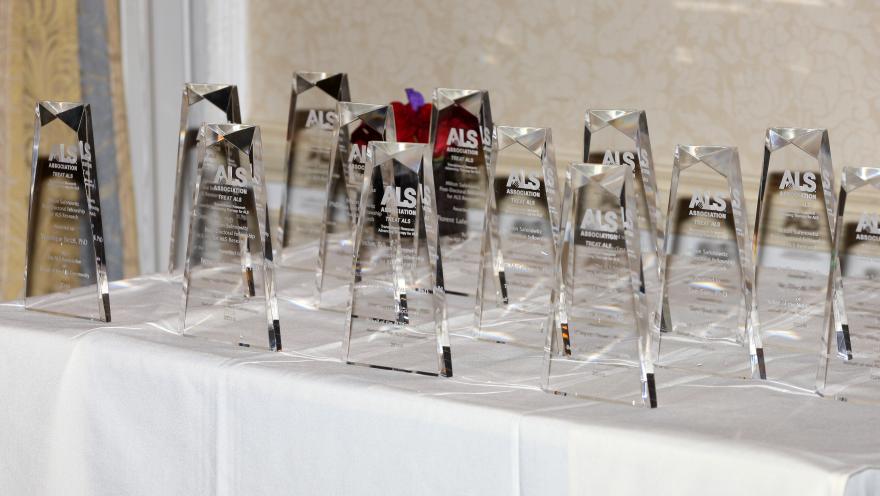On June 10, 2016, The ALS Association brought together the current and past awardees of its Milton Safenowitz Postdoctoral Fellowship to participate in a day-long research symposium and awards ceremony. The workshop was funded by The Greater New York Chapter of The ALS Association.
About the Award
The award was founded by the Safenowitz family through The Greater New York Chapter of The ALS Association. It is in memory of Mr. Safenowitz, who died of ALS in 1998. These awards are to encourage and facilitate promising young scientists to enter the ALS field. Fellows work with a senior mentor and receive extensive exposure to the ALS research community through meetings and presentations, like this workshop. After completing this fellowship, approximately 90 percent of the awardees stay in ALS research. They go on to establish their own laboratories to continue studying ALS and mentoring more ALS researchers along the way.
Collaboration Encouraged
This bi-annual workshop is designed to bring the latest postdoc awardees together to share research ideas and collaboration is highly encouraged. During the awards luncheon, the grandchildren of Mr. Safenowitz, Bailey del Valle, Samantha Levine and Jeff Safenowitz, expressed how important this program is to the memory of their grandfather. Marilyn Safenowitz presented the awards to all the current fellows. In addition, Ride for Life is currently supporting Dr. Dejun Yang and Christopher Pendergast was in attendance to present his award.
David Goldstein, Ph.D., Director of the Institute for Genomic Medicine at Columbia University, globally renowned for his contributions in infectious diseases and epilepsy, gave the keynote presentation: “Precision Genetics and Precision Medicine in ALS: the Fruits of Collaborative Science.” He presented a comprehensive overview of how the discovery of new genes can lead to the identification of new disease pathways that drive the development of ALS therapeutic targets. For example, whole genomic sequencing efforts recently identified a new ALS gene, TBK1, which will hopefully be targeted for therapy. Significant improvements have been accomplished in gene sequencing, to read DNA faster and at a decreased cost.
Dr. Goldstein pointed out that it would take 35 years to read a person’s entire genomic sequence, reading at an average rate of 162 characters per minute. He also spoke about the power of bringing genomic data closer to the clinic by correlating clinical data obtained from people living with ALS. Together, this information will empower stratified clinical trials to improve clinical trial outcomes. Lastly, Goldstein emphasized a collaborative view of gene discovery that sharing all genomic sequencing data gathered around the world will allow us to find ALS treatments and cures faster than ever before.
Fellow Research Summaries
During the workshop, each fellow presented a short talk representing the work they have completed that was made possible by their fellowship through The ALS Association. Below is the list of fellows with the titles of their talks. For the full listing of the research presentation summaries, click here.
- Marka Van Blitterswijk, M.D., Mayo Clinic Florida, Jacksonville, Fla.
Title: Predicting the phenotype in C9orf72 expansion carriers using machine learning
- Antonia Dominguez, Ph.D., Stanford University, Stanford, Calif.
Title: Functional analysis of C9orf72 mutations in ALS via targeted genome engineering
- Fernande Freyermuth, Ph.D., Massachusetts General Hospital, Charlestown, Mass.
Title: Targeting FUS misfolding to mitigate RNA processing alterations linked to ALS
- Veronique Belzil, Ph.D., Mayo Clinic College of Medicine, Jacksonville, Fla.
Title: Characterizing the contributions of epigenetic changes in C9FTD/ALS
- Claudia Fallini, Ph.D., University of Massachusetts Medical School, Worcester, Mass.
Title: Characterizing the pathogenic role of TDP-43 in PFN1-linked ALS.
- Florent Laferriere, Ph.D., University of Zurich, Zurich, Switzerland.
Title: Contribution of protein aggregation in the pathogenesis of ALS: seeding, spreading and toxicity
- Qiang Zhu, Ph.D., Ludwig Institute at University of California, San Diego, La Jolla, Calif.
Title: Gain of toxicity from C9orf72 ALS/FTD mutation is therapeutically alleviated with antisense oligonucleotides
- Ke Zhang, Ph.D., Johns Hopkins University School of Medicine, Baltimore, Md.
Title: The role of nuclear transport defects in the pathogenesis of ALS/FTD
- Philip McGoldrick, Ph.D., University of Toronto, Toronto, Ontario
Title: Pathomechanisms of C9orf72 in real time
- Dejun Yang, M.D., Ph.D., University of Massachusetts Medical School, Worcester, Mass.
Title: Determine the mechanisms of ALS-associated poly (GR) toxicity and screening for therapeutic drugs
- Marian Hruska-Plochan, Ph.D., University of Zurich, Zurich, Switzerland
Title: Deciphering the pathogenic mechanisms of C9orf72 dipeptide proteins
- Tao Sun, Ph.D., Stanford University, Stanford, Calif.
Title: Genome wide identification of RNA editing dysregulation and upstream regulators in ALS
- Kaspar Roet, Ph.D., Boston Children’s Hospital/Harvard Medical School/Harvard Stem Cell Institute, Boston, Mass.
Title: Which potassium channel drives ALS motor neuron hyperexcitability?
- David Medina, Ph.D., Barrow Neurological lnstitute, Phoenix, Ariz.
Title: Modulating retinoid signaling as a therapeutic approach for ALS
- Jone Lopez-Erauskin, Ph.D., Ludwig Institute for Cancer Research, University of California San Diego, La Jolla, Calif.
Title: Identify key molecular targets to counteract muscle denervation in ALS.
- Russell McLaughlin, Ph.D., Trinity College Dublin, Dublin, Republic of Ireland
Title: Molecular rapprochement of neurology and psychiatry: are ALS and schizophrenia biologically convergent?
For more information on The ALS Association's Global Research Program, visit http://www.alsa.org/research/


Join the conversation. Please comment below.